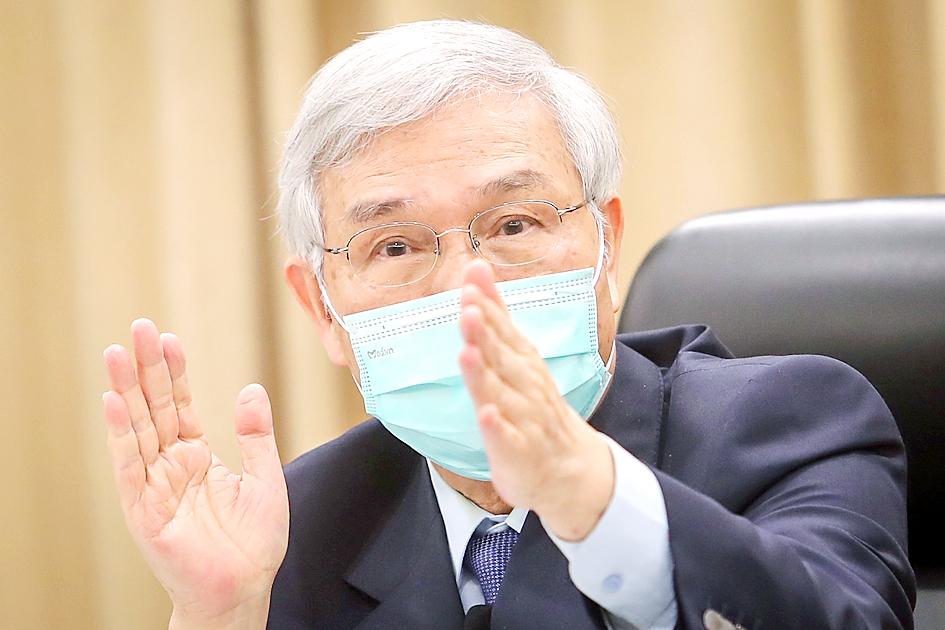The central bank yesterday tightened credit controls for second-home mortgages in specific areas and purchases of plots of land, especially in industrial parks.
However, the nation’s top monetary policymaker kept its policy rate at a record-low 1.125 percent for the sixth consecutive quarter, despite revising up its GDP growth forecast for this year from 5.08 percent to 5.75 percent.
“Board members factored in economic uncertainty at home and around the world,” central bank Governor Yang Chin-long (楊金龍) said, adding that growing inflationary pressure was a temporary phenomenon induced by bad weather and a low base effect for oil prices.

Photo: CNA
International fuel price increases underpinned higher consumer prices in Taiwan this quarter, but the trend would stabilize next quarter, Yang said, adding that consumer prices remained stable after excluding volatile energy costs.
The central bank predicted that consumer prices would expand by a mild 1.7 percent this year, based on which it decided to continue its loose monetary policy, in line with central banks in the US and other advanced nations.
Although Taiwan’s economy has outperformed its peers so far this year, the growth pace is expected to slow in the second half of the year, Yang said, adding that the central bank expects a moderate growth of 3.45 percent next year.
The economy is not overheating, Yang said, adding that unemployment rates remain relatively high due to measures to curb the spread of COVID-19 imposed after an outbreak in May.
Subdued consumer activity and lingering uncertainty amid the COVID-19 pandemic and other risks warrant a stable policy, he added.
Yang said that the central bank’s board meeting passed new credit controls after two previous efforts failed to rein in mortgage and land financing.
Starting today, the central bank bars lenders from granting grace periods to second-home purchases in Taipei, New Taipei City, Taoyuan, Taichung, Tainan, Kaohsiung, Hsinchu County and Hsinchu City, he said.
“The mild adjustment is not intended to curb property price increases, but aims to prevent overleveraging on the part of multiple home owners,” Yang said.
The six special municipalities and Hsinchu city and county account for 82.6 percent of the nation’s mortgage deals, Yang said.
Further, the central bank would lower the loan to value ratio for land financing from 65 percent to 60 percent and cut the ratio for plots in industrial parks from 55 percent to 50 percent, Yang said.
In addition, it would limit the period in which a new owner must start working on their plot in an industrial park to one year, to avoid land hoarding, Yang said.
Land hoarding leads to property price increases, which has become evident in the past few years amid onshoring and a supply chain realignment trend, Yang said.

South Korea’s equity benchmark yesterday crossed a new milestone just a month after surpassing the once-unthinkable 5,000 mark as surging global memory demand powers the country’s biggest chipmakers. The KOSPI advanced as much as 2.6 percent to a record 6,123, with Samsung Electronics Co and SK Hynix Inc each gaining more than 2 percent. With the benchmark now up 45 percent this year, South Korea’s stock market capitalization has also moved past France’s, following last month’s overtaking of Germany’s. Long overlooked by foreign funds, despite being undervalued, South Korean stocks have now emerged as clear winners in the global market. The so-called “artificial intelligence

‘SEISMIC SHIFT’: The researcher forecast there would be about 1.1 billion mobile shipments this year, down from 1.26 billion the prior year and erasing years of gains The global smartphone market is expected to contract 12.9 percent this year due to the unprecedented memorychip shortage, marking “a crisis like no other,” researcher International Data Corp (IDC) said. The new forecast, a dramatic revision down from earlier estimates, gives the latest accounting of the ongoing memory crunch that is affecting every corner of the electronics industry. The demand for advanced memory to power artificial intelligence (AI) tasks has drained global supply until well into next year and jeopardizes the business model of many smartphone makers. IDC forecast about 1.1 billion mobile shipments this year, down from 1.26 billion the prior

Chinese artificial intelligence (AI) start-up DeepSeek’s (深度求索) latest AI model, set to be released as soon as next week, was trained on Nvidia Corp’s most advanced AI chip, the Blackwell, a senior official of US President Donald Trump’s administration said on Monday, in what could represent a violation of US export controls. The US believes DeepSeek will remove the technical indicators that might reveal its use of American AI chips, the official said, adding that the Blackwells are likely clustered at its data center in Inner Mongolia, an autonomous region of China. The person declined to say how the US government received

People stand in a Pokemon store in Tokyo on Thursday. One of the world highest-grossing franchises is celebrated its 30th anniversary yesterday.